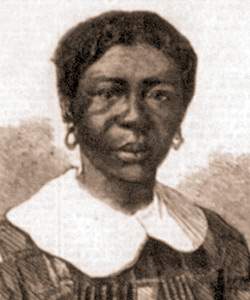Harriet Robinson Scott (American National Biography)
Scholarship
On 6 April 1846 Dred and Harriet Scott sued Irene Emerson for freedom. Dred Scott v. Irene Emerson was filed in a Missouri state court under Missouri state law. (Two separate litigations were pursued. Since both entailed the same law and evidence, only Dred's advanced to conclusion; Harriet's suit was held in abeyance, under agreement that the determination in her husband's case would apply to hers.) Contrary to later widespread rumor, no political motivation attached to the institution of this suit; only when it reached the Missouri Supreme Court did it acquire the political overtones that made it so famous later. The suit was brought for one reason only: to secure freedom for Dred Scott and his family…
Unanticipated developments converted an open-and-shut freedom suit into a cause célèbre. In the trial on 30 June 1847, the court rejected one piece of vital evidence on a legal technicality--that it was hearsay evidence and therefore not admissible--and the slave's freedom had to await a second trial when that evidence could be properly introduced. It took almost three years, until 12 January 1850, before that trial took place, a delay caused by events over which none of the litigants had any control. With the earlier legal technicality corrected, the court unhesitatingly declared Dred Scott to be free.
Unanticipated developments converted an open-and-shut freedom suit into a cause célèbre. In the trial on 30 June 1847, the court rejected one piece of vital evidence on a legal technicality--that it was hearsay evidence and therefore not admissible--and the slave's freedom had to await a second trial when that evidence could be properly introduced. It took almost three years, until 12 January 1850, before that trial took place, a delay caused by events over which none of the litigants had any control. With the earlier legal technicality corrected, the court unhesitatingly declared Dred Scott to be free.
Walter Ehrlich, "Scott, Dred," American National Biography Online, February 2000, http://www.anb.org/articles/11/11-00984.html.
Harriet Robinson Scott (VanderVelde, 1997)
Scholarship
In the progression of American people toward freedom, the contributions of one person whose life was central to that struggle have long been ignored: Harriet Robinson Scott, "Mrs. Dred Scott."
Dred Scott v. Sandfordn1 stands in infamy in American constitutional law and the history of the Supreme Court. The Court denied Dred Scott's assertion of freedom in sweeping language.n2 Most work on this famous case focuses on its conventionally significant features: the case itself, the legal records, the judges and lawyers, their ideologies and biographies, and the significance of the case in the Lincoln-Douglas debates, in the Civil War, in the Reconstruction Amendments and in the Reconstruction Court.n3 No one has focused on the eye of the hurricane: the quiet, silent family members whose lives were at stake in that litigation.n4 Dred Scott, the named plaintiff, died in 1858. Although a friend purchased Dred's freedom for him after his cause was lost, he never saw the Jubilee, Emancipation, or the passage of the Thirteenth Amendment. Harriet Robinson Scott, his lawfully wedded wife, did. She brought her own case for freedom, a case that was submerged in his. She lived through the protracted litigation, the fame and infamy that the case brought, the purchase of freedom, the birth and raising of two children, her husband's death, and finally, the Jubilee. Nonetheless, conventional history has relegated her life to a footnote.
Dred Scott v. Sandfordn1 stands in infamy in American constitutional law and the history of the Supreme Court. The Court denied Dred Scott's assertion of freedom in sweeping language.n2 Most work on this famous case focuses on its conventionally significant features: the case itself, the legal records, the judges and lawyers, their ideologies and biographies, and the significance of the case in the Lincoln-Douglas debates, in the Civil War, in the Reconstruction Amendments and in the Reconstruction Court.n3 No one has focused on the eye of the hurricane: the quiet, silent family members whose lives were at stake in that litigation.n4 Dred Scott, the named plaintiff, died in 1858. Although a friend purchased Dred's freedom for him after his cause was lost, he never saw the Jubilee, Emancipation, or the passage of the Thirteenth Amendment. Harriet Robinson Scott, his lawfully wedded wife, did. She brought her own case for freedom, a case that was submerged in his. She lived through the protracted litigation, the fame and infamy that the case brought, the purchase of freedom, the birth and raising of two children, her husband's death, and finally, the Jubilee. Nonetheless, conventional history has relegated her life to a footnote.
Lea VanderVelde and Sandhya Subramanian, "Mrs. Dred Scott," Yale Law Journal 106, no. 4 (1997): 1033-1138.


